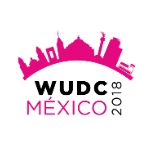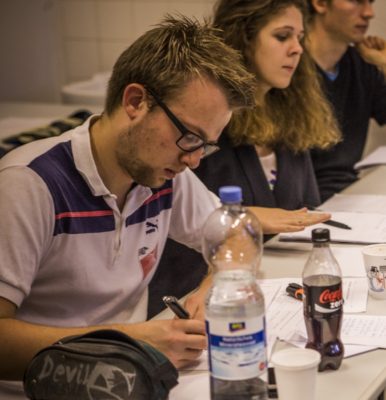WUDC council 2018: Resolution summary
During this year’s WUDC in Mexico the council met once again, discussing a series of changes. Editor Jan-Gunther Gosselke was live at the meeting and summarised the most relevant results.  Participation rules interpretation
Participation rules interpretation
The WUDC constitution states in paragraph 42.1
“Individuals may only compete in a team eligible to proceed to the Elimination Rounds in the Preliminary Rounds at a maximum of four Editions of the Championship”
One interpretation of this part assumed, that speakers could participate as often as they like. However, they (and thus their team) can only break at their first four participations. At pre-council it showed, however, that a majority interpreted this part as a so-called “grandfather rule”, which limits the total number of participations to four in order to prevent so-called “dinosauers”, very experienced debaters, from participating. A proposal sought to clarify this part. The German caucus proposed a change of the paragraph towards allowing teams to participate as break-eligible teams until they broke four times, after which they are no longer allowed to participate. The proposal reached the necessary majority in a test vote, but got postponed to next year due to some delegations wishing to speak about this with their caucus.
Anonymised team names
Back at the WUDC 2017 the council discussed introducing anonymised team names, meaning that teams would be assigned random names instead of their universities’ or societies’, e.g. “reindeer”. This year council supported testing this approach at the Capetown WUDC 2019, as long as the tab team considers it doable. The experiences gathered in Capetown will be the basement for later changes of the constitution. The tab team consideration part was added because the Capetown WUDC 2019 tab team raised complexicity concerns due to the introduction of Tabbie-Cat as new tab software.
The goal of the anonymisation is to reduce adjudicators’ biases towards renowned names. Supporters argued, that while famous speakers still would be recognized, at least less renowned speakers from famous debating societies (e.g. Harvard E, LSE D) would be less subconsciously favored. It was noted, that the proposed practice is already in use at certain American and Chinese tournaments. Adversaries claimed that many teams chose their stategy based on team names, like focusing on weaker teams to become second instead of engaging with strong teams. They also pointed at the possibility to wear university sweaters or similar merchandising, which got responded by the possibility to forbid wearing such identifying materials. There was further discussion about decoding the team names in elite circles. Lastly, concerns were raised that adjudicators could not sufficiently enter their clashes and only realize they clash once the round starts.

Jan-Gunther Gosselke – © Campbell Galón
Thailand 2020 Bid
As only potential host for the WUDC 2020 Thailand made a bid for Bangkok. The proposed venus are the catholic Assumption University of Thailand. They already hosted the eleventh All Asians Inter-Varsity Debating Championship (105 teams / 600 participants) and in 2008 the 28th WUDC (400 teams / 1500 participants). The bid was accepted unanimously. Further information is available in the WUDC council’s Google Drive.
Renaming of the ESL Grand Final Best Speaker Award
The best speaker of the ESL final so far was awarded the ESL Grand Final Best Speaker Award. In the future it will, with council following a proposal from Malaysia, be named Sadiq Ayinde Award to remind of the debater Sadiq Ayinde from the Azusa Pacific University. Sadiq was a Nigerian debater starting late with debating but making the sport his number one priority, thus overcoming initial problems with accent and tournament participation (like visa limitations), finally speaking in the ESL final of the Dutch WUDC 2017. Sadiq died surprisingly in 2017 and Malaysia suggested the renaming to keep his memory and honor his detemination to not be stopped by language barriers.
Introduction of playoff-debates als ultimate tie breaker
The break at WUDC is decided based on team points, speaker points, numer of first places, second places and third places (in that order). However, at the Mexico WUDC two teams on the last place for the EFL-break were even in all those categories. In the past this was decided by casting lots. For the future, starting there, instead a playoff-debate will take place. The playoff-debate is a normal debate with the concerned teams and, if necessary, additionally filling teams. If only two teams are concerned, they have to be in the same half of the debate (opening or closing). The filling teams are built from a certain adjudication pool of adjudicators that are not clashing with the teams and randomly chosen by the chied adjudicators.
Original by Jan-Gunther Gosselke, translation by Lennart Lokstein.
jgg./lok.






It should be mentioned that (despite the team name policy) the view was rather amazing:
https://twitter.com/Konzertant/status/947920850342305794